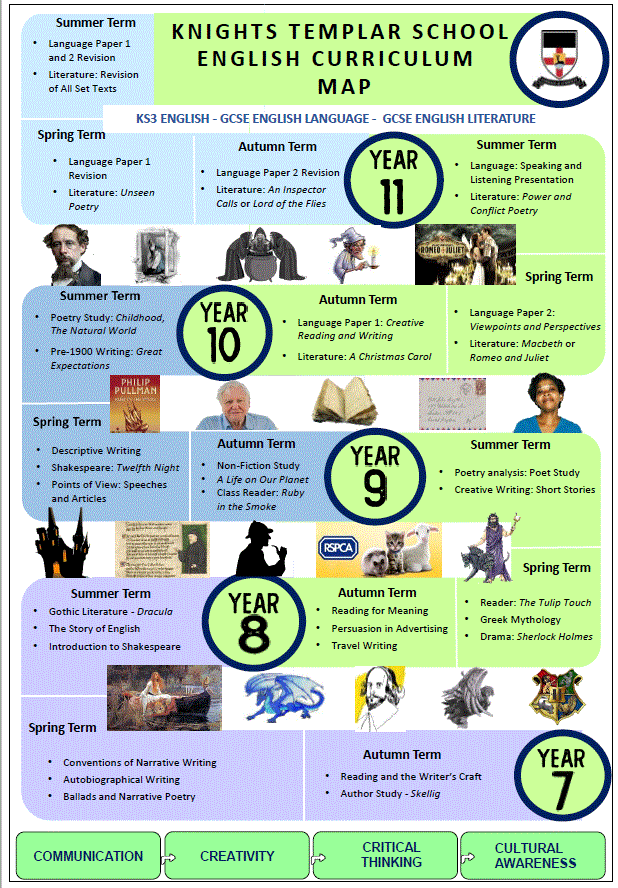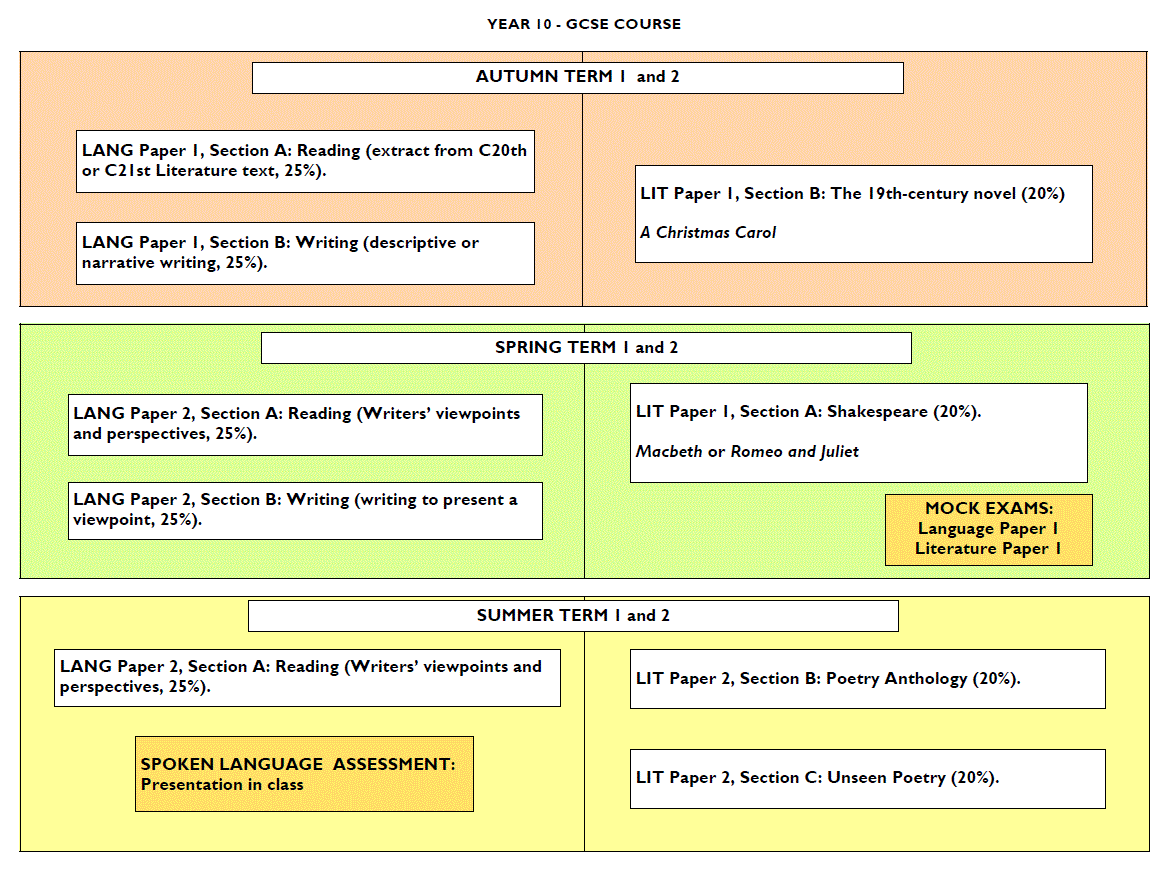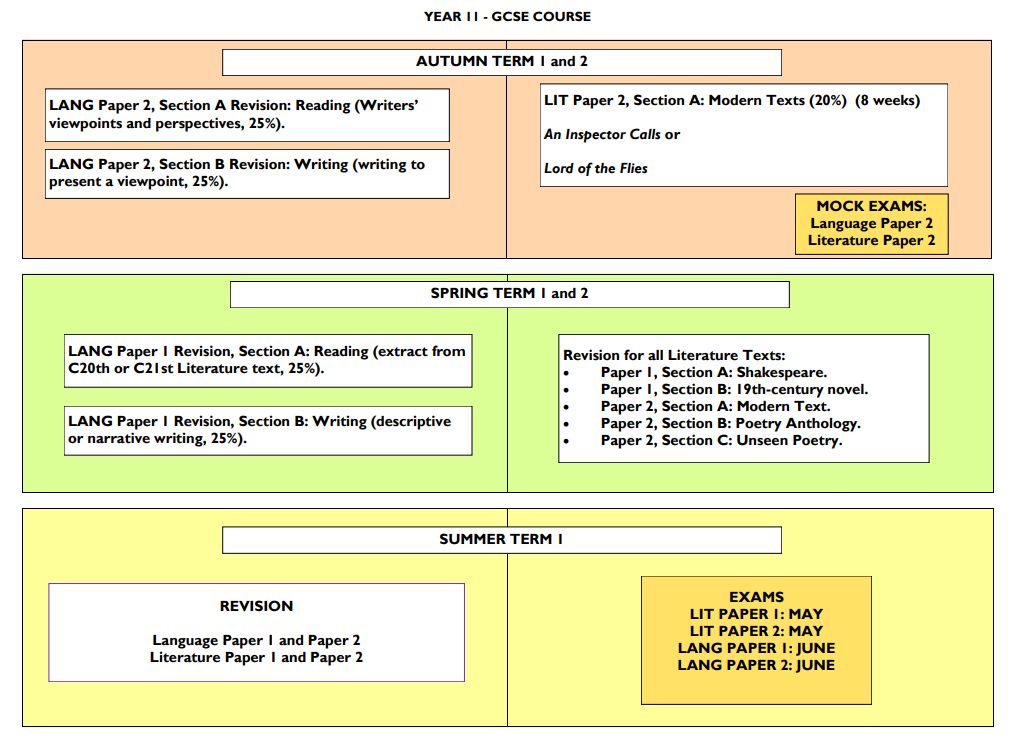Mathematics - Year 7
Click here to return to our English curriculum home page
Below you will find more specific information about the curriculum in English Language for Years 10 and 11 students, explaining to you what students will learn, when, why and how. There is also information about how parents/carers are able to support students in their learning, extra-curricular opportunities in this subject and how mathematics links to other subjects and the wider world.
|
Subject Key Concepts #1 Creativity#2 Critical Thinking#3 Communication#4 Cultural AwarenessPlease click here for Subject Key Concepts. |

Please click here for PDF English Learning Journey |
Curriculum Overview for the year
|
|
Useful Documents:
Please click here for a PDF curriculum overview for Year 10 and 11.
Please click here for a PDF Language Paper 1 Reading.
Please click here for a PDF Language Paper 1 Writing.
Please click here for a PDF Language Paper 2 Reading.
While this information covers a broad range of areas, please do get in touch with the Subject Leader Mrs Weston if you have any questions.
Please click on the questions below to find out more.
Which exam board will students be examined by?
AQA
How are groups organised?
Classes are set according to ability.
Students have 10 one hour lessons per fortnight.
How will students learn at this level?
- Reading a wide range of texts.
- Studying exemplar answers.
- Reading examples of good creative writing.
- Experimenting with different forms of creative writing.
- Working collaboratively with texts.
- Researching topics for presentation.
- Debating and expressing points of view.
- Observing presentations then responding critically and evaluatively.
- Practising written responses and creative writing.
How will students’ learning be assessed at this level?
Through two examinations, each worth 50%:
English Language Paper 1:
Explorations in Creative Reading and Writing
Section A: Reading - prose fiction extract.
You will answer four questions on aspects of the text, including the ways in which the writer uses language for effect and the structure of the text.
Section B: Writing – you will complete an extended piece of descriptive or narrative writing.
English Language Paper 2:
Writers’ Viewpoints and Perspectives
Part A: Reading – two non-fiction extracts including one pre-19th century text.
You will answer four questions, including a comparison of the ideas or attitudes expressed in the texts and an analysis of language use.
Part B: Writing – you will respond to a statement and present a point of view.
When do key assessments take place?
Year 10 end of year exams – April/May
Year 11 mock exams – January
Year 11 exams – June
You will complete practice questions throughout the course to test your knowledge and understanding of key concepts and the requirements of each assessment objective.
How can parents/carers support students’ learning?
- By encouraging the reading of a range of quality non-fiction writing and discussing its language use, ideas and merits
- By discussing current affairs and encouraging the exchange of opinions and beliefs in rational debate.
- By encouraging and supporting creative writing, reading plans and finished pieces and responding with constructive criticism.
- By showing interest in the presentation topic and listening to the finished presentation, giving constructive feedback.
What equipment do students need for this subject?
Writing equipment
Dictionary and thesaurus
How does this subject link to other subjects?
- Literacy – all subjects
- Analytical skills – most subjects
- Communication skills – all subjects
What websites or resources may be helpful to support students’ learning?
AQA Exam Board website
BBC Bitesize
Newspapers and magazines on current topics
What extra-curricular or enrichment opportunities are available for students in this subject at this level?
KTS Best Books – writing a review for publication on the KTS website
Creative Writing competitions
What sort of careers can this subject lead to?
- Journalism
- Teaching
- Freelance writing
- Law
- Any career requiring high level literacy skills
What does student work look like in this subject at this level?
How does this subject support a broad and balanced curriculum, meeting the needs of all students, and developing traditional core skills?
Broad and balanced:
We cover a wide range of fiction including pre-1900 texts and texts from other cultures.
We study a range of non-fiction texts, including topics relating to current issues, and encourage critical thinking skills.
Meeting the needs of all students:
We differentiate appropriately in all lessons, adapting unit tasks and all assessments to ensure they are challenging and accessible to all pupils.
Texts are selected according to the ability, strengths and interests of students.
TAs are used effectively to support students and we liaise with relevant agencies/staff to ensure students’ needs are met.
Traditional core skills:
Literacy is at the heart of the English curriculum. We also develop critical thinking skills, encourage the forming and expression of opinion and consider ethics and morality when studying literature in particular.
How does this subject promote creativity, critical thinking, practice, perseverance and resilience, and making links?
Creativity:
We develop thinking skills and encourage students to respond creatively to texts and ideas explored in lessons.
We encourage creative writing throughout the key stage, allowing students the opportunity to think of their own ideas and develop them in the way they wish.
Critical thinking:
We encourage pupils to think about a range of issues, ideas, language use and writers’ intentions throughout the course. They are expected to formulate their own responses and ideas, identifying strengths and weaknesses and expressing their own views clearly and articulately.
Practice, perseverance and resilience:
We encourage drafting and self-editing to enable pupils to identify their own errors and improve the quality of their writing.
We encourage students to complete longer writing tasks on a regular basis to develop writing resilience and read longer, challenging texts and extracts to develop reading resilience. Pupils are encouraged to persevere with challenging tasks and we break down more complex tasks to ensure they are less daunting and more accessible to all students.
How does this subject encourage enrichment and the development of cultural capital, deep learning, and inclusivity?
Enrichment/cultural capital:
We study a range of extracts from literary texts covering three centuries and diverse themes. We study a broad range of non-fiction from a range of writers expressing a wide variety of opinions and viewpoints.
Substance/deep learning:
We study texts written for adult readers. Students are encouraged to think about mature ideas and themes and reflect on a range of issues.
All ideas are fully explored and tested to ensure pupils have a thorough knowledge and understanding of the skills taught throughout the year.
Open and inclusive:
We ensure all literature and non-fiction studied is relatable and accessible to all students. The themes reflect a wide number of concerns and issues, which are always dealt with appropriately and with sensitivity. We actively promote inclusivity in all of our units and within our classroom teaching.








